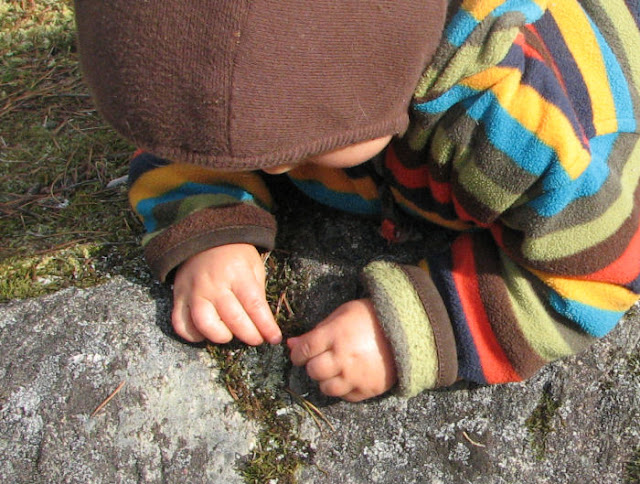- read a post at Radio Free School called Staying Local
- finally replied with my feelings about our learning centre taking a family field-trip to Mexico
- went on another (f)Unschool adventure close to home
The Radio Free School post inspired me to chime in on the issue, too. So here it is.
I've always felt very strongly that the beginning of any exploration (including life) needs to begin with the self. When a baby is born she first discovers the feeling of touch on dry skin; of air in her lungs, and the sound of her own voice. As she nurses, the simple act of living is her connection with her mother and her experience of the world around her. As she grows and her eyes become able to focus; her ears to differentiate voices, intonations, pressure changes, etc. she begins her relationship with the wider world. She moves into this relationship from a place of security, knowing that the strong connection she has with her mother will be her safety net; her 'home'. At first she will watch the world from her mother's breast: the changing texture of skin, the rolling of her mother's hair, the smell of milk and sweat; the feelings she's experiencing, and her own breath. Eventually she will take interest in movement and light, in her parents' faces and clothing, and also in others. She will look out from the safety of the arms whose smell and touch she knows as 'home' to explore the world around her with her eyes and ears, with her nose, and eventually with her skin and mouth. As she ventures into that world, she will return to 'home' for security and reassurance, at first dozens of times during the day, then perhaps one dozen, then just a few, as the safety net she's developed in her firm rooting of 'home' becomes less and less necessary. Eventually she'll move out of her parents' house and return perhaps once every few days with a phonecall to her parents or siblings, to talk.
It is the knowledge that that 'home' exists that gives her courage to explore beyond it.
I think most of us accept this scenario as normal. So isn't it normal, too, then, to expect all learning to follow a similar course? When our learning community was pondering having a family fieldtrip to Mexico, I responded that although I understand that those who can afford to travel find educational benefit in seeing other countries, I think it's very important, especially for younger kids, to learn and become inspired about our own home community, first. Although our kids do projects and field-trips and vacations to learn about other countries, cultures, and ecosystems, when do they learn about their own homes? How much time do most of us really spend getting to know our immediate surroundings? Every week I take families out to explore our island - the richness of history, ecology, biology, and sociology on this island is the same as everywhere else in the world, and it's free for us to explore. Every week, most if not all of the kids make discoveries that to them are 'amazing': things in our own 'home' that they never knew existed; things which inspire them to be interested in learning of all sorts, that inspire them to be curious learners, in general. We're developing a close bond with our home, so that the complex sciences of life have a grounding in that safe place the children know; so that we can grow our interest in these sciences from our deep understanding and concern for how those sciences apply to our 'home'.
We know home matters, so it matters to us to learn about it. Our learning community's director answered my email with these words: "One thing I really notice is that young kids especially are very present and mostly noticing the little things right in front of their noses. If you take them on some far away trip, what they remember the most is the flower they picked, or the water in the pool, or the dog that played with them, or the big hole they saw - which leaves you wondering why you paid so much money to go that far anyways!"
A couple of years ago I led a folk-song series with kids from our learning community, and did what I felt was natural: I started them off with a map of our island, and encouraged them to find their homes. From there, we began by singing songs about our island. It was that simple. Yes, we covered topics such as folk music, mining (there are mines on the island, marked on the map), driving (we pretended to drive around the map) and island life, but the root of it all was the children's understanding of their connection to the bit of land we call 'home'.
This past week for our usual (f)Unschool exploration we went up the bluffs on Mt. Collins. We got to know a piece of our home. Here are some visuals, photographed by myself, Rhiannon, and Beata:
Microcosm:
smell, touch, texture, physical connection, and tiny tiny things to see and hear
being here
Macrocosm:
Our smallness on the big island that sometimes seems small, itself. Our insignificance on a steep mossy slope; trees and rocks and animals whose existence supports ours, and whose fate is our responsibility.
Being Here.
Synthesis:
(Joy!)














No comments:
Post a Comment
Your comment will appear after it is approved. This can take a while!